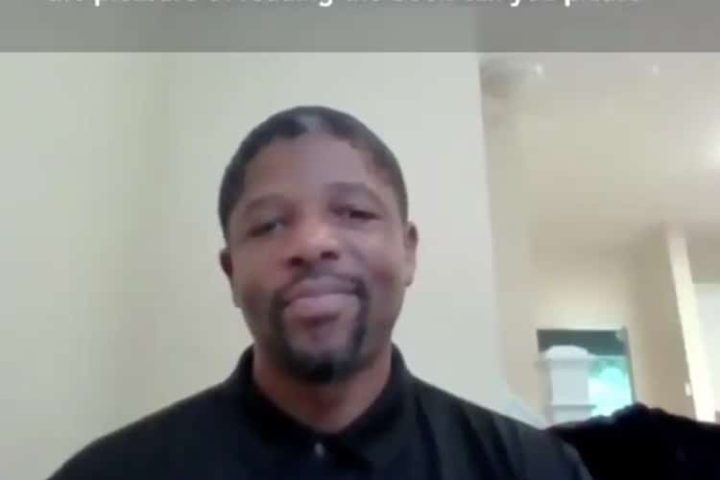
At least he’s not a theology professor, though it wouldn’t be surprising if he were. Issac Bailey, a columnist and public policy professor at Davidson College in North Carolina, says he’s struggling with his Christian faith — because of you.
Well, that is, if you happen to be a Christian Trump supporter (as many of my readers are).
“I’m struggling to hold fast to my Christianity — because of Donald Trump,” Bailey wrote Monday at Newsweek. “Not exactly Trump himself, though, but the undying support of the self-professed Christian pro-life movement that he enjoyed. My faith is in tatters because of that alliance. And I am constantly wondering if I am indirectly complicit because I dedicated my life to the same Jesus the insurrectionists prayed to in the Capitol building after ransacking it and promising to kill those who didn’t do their bidding.”
(I’m not sure that’s actually what happened, but okay…)
But here’s Bailey’s money line: “If Christianity can convince so many to follow a man like Trump almost worshipfully — or couldn’t at least help millions discern the unique threat Trump represented — what good is it really?”
Of course, just asking this question is an indictment of faith; not Christianity, though, but the professor’s own.
First, one curious thing about Bailey is the double standard he applies to faith. Writing at PJ Media, Robert Spencer points out that on December 6, 2020, the academic tweeted: “In the aftermath of 9/11, some Americans warned politicians would use that horrific event to pass laws that stifled freedom and targeted Muslims. They were right. That’s what’s being referred to here. Beheadings should not be used to target Muslims and excuse racism.”
This reflects a sloppiness that seems to punctuate Bailey’s thinking. What race, after all, is “Muslim”? Albania, do note, is a country of white Muslims.
(Moreover, Muslims were not in fact targeted post-9/11 in the way the professor implies. Yet ever since the Capitol “some people did something” event [hat tip: Ilhan Omar], cancel culture has entered high gear. Will Bailey say anything about that?)
As to the double-standard issue, Spencer makes an excellent point: If the professor “can say that Trump is so evil that he is struggling with his Christianity because many Christians support Trump, why doesn’t the same reasoning go for Islam?”
“Issac Bailey does not write and likely never would dream of writing something like this,” Spencer continues: “If Islam can convince so many to follow a man like Osama bin Laden or Abu Bakr al-Baghdadi almost worshipfully — or couldn’t at least help millions discern the unique threat they and others like them represented — what good is it really?”
He certainly would not. And it’s interesting that he’s an apologist for Islam but not his “own” faith.
Speaking of which, in 2015 Bailey penned an article entitled “Evil, in the Name of Jesus” in which he wrote:
For awhile now, I’ve been asking people a simple question.
If the terrorist organization ISIL is Islamic, and represents something profound about that faith, does the same standard apply to Christianity and the Christian Knights of the Ku Klux Klan?
I haven’t gotten many good answers, or any direct ones, actually.
Perhaps this isn’t surprising since Bailey’s set has long avoided debating anyone who could actually provide such an answer and now is busy “cancelling” them. The answer, however, is “No.”
Relevant is what a given faith teaches. Does adhering to the religion’s tenets make you more godly or less so? Religions are called “different religions” for a simple reason: They’re different. And is it possible that two faiths having profoundly different bases for their moral law (e.g., Ten Commandments vs. Sharia) could lead to characteristic behavioral differences between their sets of adherents?
If Bailey hasn’t pondered this, it’s no wonder he’s struggling with his faith: His grasp of it was always shallow to begin with. This matters because, as good theologians will instruct, faith is “an act of the will informed by reason.”
Of course, one could leave it there, or even wonder how the professor could suppose that honed Christian discernment would dictate support for a party advocating prenatal infanticide (sometimes up to birth), closure of churches under the pretext of disease mitigation, putting boys in girls’ bathrooms, and our Sexual Devolution in general. Yet there’s a deeper point to be made.
Even if we accept for argument’s sake Bailey’s assumption that Trump-supporting American Christians have stumbled badly, the reality is Christians always stumble badly. But is this an indictment of the faith or of the faithful?
As philosopher G.K. Chesterton put it, “Christianity has not been tried and found wanting; it has been found difficult, and left untried.” Of course. Christianity is not designer religion; it’s not that easy, “Whatever works for you, man” standard chosen because, just coincidentally, it happens to conform to the chooser’s hedonistic preferences. In fact, the faithful don’t even consider it just a stringent standard.
They believe it’s the perfect one — with Jesus being the embodiment of that perfection.
It follows from this that man will never live up to it because he can never be perfect. All “have sinned and come short of the glory of God,” as the Bible puts it.
This brings us to why knowing Christians embrace the faith, which happens to be the only reason to embrace a faith: We believe it’s true. And the behavior of others claiming co-religionist status, or even of clergymen, is irrelevant to this point.
This isn’t to say people’s fruits shouldn’t be noted. For example, I often cite a German study involving 45,000 young people that found that while increasing religiosity made Christian youth less violent, it made Muslim youth more violent. Yet you can’t leave it there. The next task is determining what in the given faith, if anything, leads to the negative outcome.
If you find something, the faith’s validity is called into question; if you find nothing, the “faithful” then, well, are perhaps not all that faithful.
Much, much more could be said. But we should lastly note that any moral benefits Christianity offers are not the most important thing it’s “good for.” Rather, a believer knows that would be eternal salvation, the promise of Heaven itself.
So what all this means is that Professor Bailey certainly has problems with his faith — but I suspect they have nothing to do with Trump supporters.



